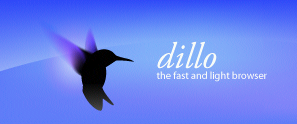This help page is for the old "Dillo1" series of releases.
Introduction:
|
|
We really hope you enjoy using Dillo. Please bear in mind that
although it's very stable, it's still
beta.
Before you get started exploring
the www using this program, be sure to keep an eye on the
hints and tricks
we collected here and which probably will answer some questions that could
come to your mind later. :)
|
Basic things:
|
- You can tell a link from plain content by the hand-shaped cursor.
- Besides browsing the web, Dillo also has basic file browsing
capabilities included. So, entering file: in your
Dillo URL window will give you the contents of your current
working directory, and file:~ entered in the
same place will point your Dillo browser right to your home
directory...
- Dillo, at this stage of development, yet is not ready
to render pages that utilize frames.
Nevertheless, it comes with a tiny handler (lynx/w3m like) that will
let you choose wich frame to visit, one by one.
- Dillo has context
sensitive menus using the
right mouse button (available on pages, links, images, the Back
and Forward buttons, and bug meter).
- Some of the functions in Dillo are handled by independent
processes. For instance, downloads come through wget.
If Dillo crashes, or simply exits, the download
will survive! (more details below).
|
Usage:
|
- You can scroll around your Dillo main window using
CTRL+{PgUp|PgDwn|Home|End} or using the mouse middle button. If
nothing happens when keys are pressed, try
focussing your Dillo main
window, first, by clicking it (not on any link!:)).
- You can use the space key as PgDn, and {'b' | 'B'} as PgUp.
- Same way, you can use "," and "." as shortcuts for
forward and backward buttons (mnemonic: those
keys are usually labeled "<" and ">").
- Ctrl+B and ";" serve as shortcuts for bookmarks.
- Whenever you feel like customizing your Dillo browser or are
somewhat unhappy with the way it looks or acts, you might want to
check your dillorc file (if you
don't have a copy of it on your ~/.dillo/ directory, get it
here).
It holds quite an amount of
options on how to configure appearance and behaviour of the
D. This file is very well commented, so you won't feel lost
moving around in there.
- Clicking the "Reload" button always will request an end-to-end reload
of the site currently viewed, but it will *not* reload embedded
images during this process.
- Dialogs can be closed with the ESC key.
- Following the desires of modern desktop users, Dillo also
features removable control panels, so you are able to rip the main
menu, the URI window and the navigation bar out of the program main
window (by dragging them from the leftmost part) and place them
wherever you want on your desktop.
- The whole window area can be used to display the pages. Just
click on the lower right corner icon, or double-click
on an empty area!
|
Downloads:
|
|
Downloads are made using wget
through the dpi framework. Starting from Dillo-0.8.6 there's
a FLTK2-based GUI for downloads.
If you're not a developer pick a binary package of Dillo-0.8.6
for your distribution and that's it!
If you want to compile it, you'll need FLTK2
installed (SVN revision 4898 is recommended).
If you don't want the FLTK2 GUI at all, use:
./configure --disable-dlgui
That will fallback to the console-based downloads dpi.
|
Find text:
|
|
This one is very useful;
it can be found in the right-mouse-button menu
Find text is tuned for speed so don't hesitate to use it even for the minimal
searches.
Semantics:
- You can search for substrings, words and sentences.
- To find a substring or word, just enter its text.
- To find a left-aligned substring, preceed it with a space.
- To find a right-aligned substring, append a space to it.
- To find full words only, preceed and append spaces to them.
- To find a sentence, enter its words and remember that the above rules
apply for every word in it.
Dillo will scroll the page and highlight found text!
Shortcut: "/" or [CTRL]+"F".
|
Copy&Paste:
|
|
Very easy: just hold the left mouse button and move to mark
a selected area. To paste, go to the target application and
press the middle mouse button.
If you want to select more than one screen, hold the mouse button
pressed and scroll with PgUp, PgDn or the arrow keys.
If you want to paste an URL into Dillo, do it on the "clear-URL"
button (the one next to the location bar).
|
Navigation history:
|
|
Currently, navigation history supports the navigation-stack model; just
right-click on the Back or Forward buttons and they will popup!
Remember:
- These history menus are relative to the current page.
- They show the page-title but the status bar shows the URL.
- Left-click jumps to the selected item.
- Middle-click opens the item in a new browser window.
|
Cookies:
|
|
Because of privacy considerations, cookies are disabled by default
in dillo. That is, if you just compile and use dillo, it will reject
every single cookie sent to it!
If you want to know how to enable cookies in dillo, please read
Cookies.txt. It explains everything in
a brief and clear way (it's just a matter of setting up
cookiesrc).
|
Bookmarks:
|
|
Starting from dillo-0.7.0, bookmarks are handled with the new
dpi framework.
This should be transparent to the end user. Please note that:
- It is a good idea to keep a backup of your
~/.dillo/bm.txt
- The server will stay alive after closing dillo.
- You can stop the server anytime sending it a KILL signal. Dillo
will automatically restart it on demand.
- If you don't have root access, install dpid and
the dpis
inside your
~/.dillo/ directory as explained
in the README file.
|
Bug Meter:
|
|
Dillo's Bug meter shows the number of
detected bugs inside the
page. The bugs are catched at parsing time, and therefore the
error messages also show the line where they occur and provide a
hint of what was expected
instead!
The primary goal of the bug meter is to
help webmasters and page
authors to polish the contents of their sites with a view to make
them standards compliant.
The Bug meter is located at the lower right corner of
Dillo. Left-click to see the messages, right-click for a menu.
(tell me more).
|
Keyboard shortcuts:
|
Shortcut Mnemonic Function
------------------------------------------------------------
Ctrl-L "Ctrl-Location" (enter a new URL)
Ctrl-U "Ctrl-URL" (edit the URL)
Ctrl-F "Ctrl-Find" (find text)
Ctrl-S "Ctrl-Search" (search the web)
Ctrl-R "Ctrl-Reload" (reload current page)
Ctrl-N "Ctrl-New" (New browser window)
Ctrl-O "Ctrl-Open" (Open file)
Ctrl-H "Ctrl-Hide" (Hide/show controls)
Ctrl-B or ";" "Ctrl-Bookmarks" (view bookmarks)
Ctrl-Q "Ctrl-Quit" (quit window)
------------------------------------------------------------
Back or "," "<" (previous page)
Shift-Back or "." ">" (next page)
Esc "escape" (close dialog)
Alt-F "File" (file menu)
Alt-X "eXit" (exit Dillo)
------------------------------------------------------------
|
|



